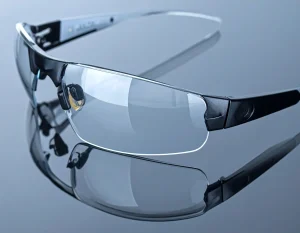In Canada adults usually have an optics prescription valid for at most two years. For children under 19, the prescription is typically only valid for one year.
To ensure that our clients receive the highest level of care and safety, we always verify the date before completing any order. Eye health regulations in Ontario and throughout Canada are essential to protecting vision and detecting changes as soon as possible.
Further below, we tell you a bit more about how prescription timelines operate and why it’s important to get an eye checkup regularly.
What Prescription Validity Means
In Canada, prescription validity means the period during which your prescription for eyewear is considered medically accurate. Filling prescription glasses or contact lenses is legally permissible during this period.
In Waterloo and across Ontario, the average adult holds a prescription that lasts 12-24 months. How long can I wear contact lenses? This time period varies widely based on your ocular health, age, and type of lenses needed.
These regulations are put into practice by your eye care professionals and by responsible eyewear retailers like us to provide you with the safest vision correction available. The date of expiry is usually indicated as “Valid for 12 months from date of exam.
This aligns with the proposed exam validity periods, which are generally two years for adults and more often for children whose eyes are still developing. Regularly updating your prescription is key to maintaining optimal vision and overall eye health.
Understanding Your Eyewear Script
A valid eyewear prescription includes several key details: lens power (sphere), cylinder for astigmatism, axis, prism correction if needed, and sometimes specific lens recommendations.
For contact lenses, prescriptions go a little deeper with base curve, diameter, and brand added. We know that these terms may seem intimidating, but don’t be discouraged!
For instance, an eyeglass prescription would indicate “-2.00 SPH, -0.75 CYL, 180 AXIS.” That means you require two forms of correction within one lens. Contact lens scripts will include numbers such as “BC 8.6, DIA 14.2” to describe the curvature and dimensions of the lens for proper fit.
We understand these numbers can be intimidating, so we’re always willing to talk you through them in person. When your prescription is tailored down to the millimeter, your glasses or contacts will fit perfectly, allowing you to view the world – clearly and comfortably – all day long.
Why Expiry Dates Exist
Expiry dates on prescriptions exist for two main reasons: to make sure your vision correction is still accurate, and to check your eyes for any changes in health.
Our vision can be altered gradually over years, or quickly by acute health conditions, changes in life or work style or even through medications. An expired prescription can do more than result in blurry vision – it can cover up serious issues such as glaucoma or diabetes.
This is why contact lens prescriptions typically expire after only one year. In comparison, glasses prescriptions can last for two years or more. For pediatric patients, who are growing and developing at a much quicker pace, we suggest updating even more frequently.
Glasses vs. Contacts Validity
Glasses prescription validity differs from contact lens validity. Glasses scripts are typically valid for two years as long as your eyes are in good health.
Valid contact lens prescriptions, however, typically only last for one year before they expire. The shorter validity period is because of contacts sitting directly on the eye.
That’s why maintaining fit, oxygen flow, and hygiene is even more important. How your lifestyle affects your eyewear options.
If you switch back and forth from glasses to contacts or need specialty lenses, your renewal timeline will vary. For example, someone with dry eyes might require a new contact lens prescription more often.
Someone who wears only glasses usually doesn’t need to change their prescription as frequently. Our staff will help make sure your prescription – and by extension, your vision – is up to date, safe, and customized for your unique lifestyle.

How Long Prescriptions Last in Canada
When we discuss how long an optical prescription is good for in Canada, the answer isn’t cut and dry. The regulations are different depending on what province you are in, your age, and even the health of your eyes. You come first, always and every way.
Our mission is to make it easier for you to find the right mix of fashion, function and fit. Here’s what you should understand in order to stay on top of your sight and keeping looking your best.
1. The Standard Canadian Guideline
Generally, across Canada, most optical prescriptions do not expire sooner than 1 year or 2 years after your exam date. For glasses, a 2-year period is typical, dovetailing with the interval suggested for comprehensive eye exams for adults.
Contact lens prescriptions typically only last 1 year because contacts come in direct contact with your eyes and require more oversight. You’ll find the expiration date around the notes section, such as “Good for 12 months from date of exam.
Other instances, particularly where there is an increased risk for changes in vision, receive a 6- or 12-month validity instead. Staying on track with these timelines protects your eyes. You will help keep your prescription up to date to provide you with the most accurate correction and best vision.
2. Provincial Variations to Note
Each province creates its own set of rules. For example, in Ontario, the standard length of a contact lens prescription is one year. On the other hand, glasses prescriptions can be for two years.
British Columbia is also likely to adhere to similar guidelines, but be sure to confirm specifics with your provider. These differences are significant. In Canada, if you move or buy eyewear in another province, you could be subject to different rules.
We work with our clients to keep them informed so they never miss a renewal and risk relying on an invalid script.
3. Age: How It Changes Things
Children and adolescents undergo ocular / refractive changes very quickly. Due to these changes, their prescriptions require more frequent updating, sometimes even within 6-12 months.
Since children’s eyes continue to grow until around age 20-21, routine examinations are essential. For the most part, adults are two year renewals until something health related would change their prescription.
As we age, we become more likely to develop various eye conditions. Older adults may need to plan for regular follow-ups if their eye doctor sees sudden changes in their eyesight.
4. Specific Eye Conditions Impact
If you’re living with diabetes, glaucoma, or other eye health concerns, your prescription may be up to die sooner. These conditions are such that your eyes can change frequently, and you will require an up-to-date prescription to stay ahead.
Optometrists check your general eye health and can advise you when it’s appropriate to get a new prescription before three years. They make sure that your eyewear is serving your current vision needs.
Personalized treatment to meet specialized needs are essential to ensuring comfort and safety.
5. Optometrist vs. Ophthalmologist Scripts
Both types of eye doctors are able to prescribe, but it depends on the situation. Optometrists typically provide routine eye exams and prescriptions for glasses or contacts.
Ophthalmologists, as MDs, are used to dealing with more difficult cases. Specialists can write prescriptions with other validity periods or annotate them for specialty exams and findings.

Why Do Prescriptions Expire Anyway?
In Canada, optical prescriptions must always expire – and for very good reason. This isn’t red tape – it’s a protection for your eyesight and overall health. At Premier Optical, you come first. We’re passionate about more than just getting you the look you love, we’re dedicated to keeping your eyes healthy and your prescription up-to-date.
Here are the primary reasons prescriptions expire and why annual renewals are important.
Your Vision Changes Naturally
Your Vision Changes Naturally Just like everything else, our eyes are not immune to the effects of time. Natural aging, health conditions such as diabetes, or even normal daily screen use can affect our visual ability. Most adults have changes to their vision when they start to reach their 40s.
They may require additional illumination to read, or they may have difficulty with fine print. Children and young adults, whose eyes are still developing, typically require more frequent examinations. A prescription that was appropriate last year may no longer be suitable today.
Staying on top of these changes is imperative. Signs that your prescription may not be right include frequent squinting, frequent headaches, blurry vision, and difficulty seeing at night. It’s true that most prescriptions in Canada expire after one or two years.
Others could expire much sooner if there are changes to a patient’s eye health. That’s why routine eye exams allow us to detect these changes early, providing solutions that keep your vision as clear and comfortable as possible.
Catching Eye Health Issues Early
An active prescription is not only a string of digits – it’s an indicator that your eyes have been thoroughly examined for potentially serious health conditions. Did you know that eye exams can catch issues you don’t notice through symptoms, such as glaucoma, cataracts, or early indications of diabetes?
Catching these issues early allows for faster, less complicated treatment and overall improvement. At Premier Optical, we offer comprehensive, full-service eye exams that monitor every element of your vision and ocular health.
We all understand the simple truth that it’s better to address problems when they’re small before they grow into something larger. A number of conditions present themselves first in the eyes. When you receive regular comprehensive eye exams, you play an important role in protecting your total health.
Legal and Safety Requirements
For their part, Canadian law establishes a clearer boundary around the limits of prescription validity to defend their clients and providers. Not only is using an expired prescription dangerous, but it may be illegal.
After a prescription expires, we can no longer ensure the safety of the product or its effectiveness for you. We pride ourselves as being licensed opticians ensuring every prescription we fill is carefully checked against these standards.
We closely track our records and regularly check prescription status. We work with you to meet your specific needs and make sure that your personal eyewear is safe and effective. That protection ensures that you are getting the best care possible.
From same day lens replacement, direct billing to insurance, to shopping our hand picked collection of exclusive designer frames, we have a solution for everyone!
Risks of Using Expired Prescriptions
Here’s what you need to know about why going with an expired optical prescription is more than a little mistake. In Waterloo, as in the rest of Canada, optical prescriptions have an explicit expiry date – and for good reason. Our vision and eye health can fluctuate, and outdated prescriptions can leave us without the right fit for our needs today.
For most of us, it’s a thrill to select the right frame for our face or have some fun with the newest lens technology. The first step to reaping all these rewards is making sure you have an active prescription to fill.
Why Retailers Can’t Fill It
Retailers, like our team at Premier Optical, are restricted legally by provincial and national regulations. We wish we could fill expired prescriptions. Dispensing eyewear or contact lenses without the most current specifications puts your sight at risk.
Further, it can result in liability for the provider as well as the client. Legal compliance protects everyone in this situation. As always, we recommend confirming that your prescription is up-to-date before you come in. This ensures the whole experience remains seamless, and you get to enjoy browsing our unique eyewear collection without any bumps along the road.
Potential Vision Strain Issues
This is one reason wearing glasses or contact lenses with an expired prescription can lead to vision strain. You may be experiencing symptoms such as headache, blurred vision, or eye fatigue after extended periods of time at work or reading.
For contact lens wearers, the dangers compound. Inadequate lens care can lead to corneal thinning and distortion, particularly if lenses are worn beyond their approved lifespan. The vision correction from expired prescriptions is not adequate for eye health.
This may result in discomfort or even dry eye, sometimes due to lens deposits or the formation of a biofilm. The good news is regular eye exams let us catch these problems early. As a rule, we guide clients in the prevention of eye strain by recommending regular breaks, appropriate lighting, and updated prescriptions for long-term comfort.
Missing Important Health Clues
They’re about much more than checking your vision, though eye exams can identify early signs of more serious health problems. Expired prescriptions can hide significant developments in your vision.
This oversight can lead to missing significant issues such as glaucoma, cataracts, or other changes in vision due to diabetes. By maintaining prescriptions to date we’re better able to monitor shifts in vision and identify warning signs early on before they develop into more serious issues.
Don’t forget that regular eye exams are important for your eyes and your health! We see current prescriptions as foundational to a preventive care approach. More than anything, they are passionate about helping their clients protect their vision and health.

Manage Your Prescription Renewals
It’s essential to keep your vision clear and your look fashionable, but it all begins with managing your optical prescription renewals. In Canada, the majority of glasses prescriptions are valid for one to two years. Two years is standard for adults, however, for children, annual renewals are most appropriate.
Contact lens renewal periods are necessary to your health and safety. Together, they provide an alternative to our usual, comprehensive, full-service eye exams, which we continue to offer here in Waterloo.
Track Your Expiry Date Simply
We understand that everyday life can be hectic, which is why we make tracking your prescription expiry date easy. It’s usually pretty obvious when a prescription expires, such as “Valid for one year from the date of exam.
We suggest using your phone’s calendar or a simple reminder app to set reminders for these dates. For the low-tech among us, a wall calendar will do the trick just as easily.
Schedule a renewal reminder one month prior to expiration so that you have ample time to schedule your next renewal exam. Keeping everything organized will prevent any of those last-minute mad dashes.
With an organized approach, you’ll avoid panicking about having enough time before a major trip or milestone occasion.
Plan Ahead for Smooth Updates
Managing your prescription renewals in advance prevents the anxiety and worry. Our recommendation is to schedule your next eye exam as soon as you receive your current prescription.
This is particularly convenient if you are going on a trip, need your glasses for a job interview or buy glasses online. With an up-to-date prescription, future online shopping trips are easy, convenient and quick.
Keeping your personal health record current helps you get preventive care services. Be it in a file at your house or on our direct billing system, it keeps everything flowing like a well-oiled machine.
We’re big believers in the idea here at T4A that some advance preparation avoids any hiccups when it’s time to renew.
Signs You Need New Lenses
Often, your eyes will tell you when you need a new pair. Blurry vision, headaches, or eye strain are all signs that your prescription is likely expired.
Changes in vision often occur gradually but sometimes suddenly, so vigilance is important. If you use contact lenses, it’s especially important to get into the habit of renewing them on time.
Long-term use can significantly change your cornea shape and thickness. Don’t wait to address these symptoms – the sooner you do, the better your vision will be.
Follow your routine eye exam schedule, which is every two years for most adults, to keep your eyewear working for you and to catch problems early.













